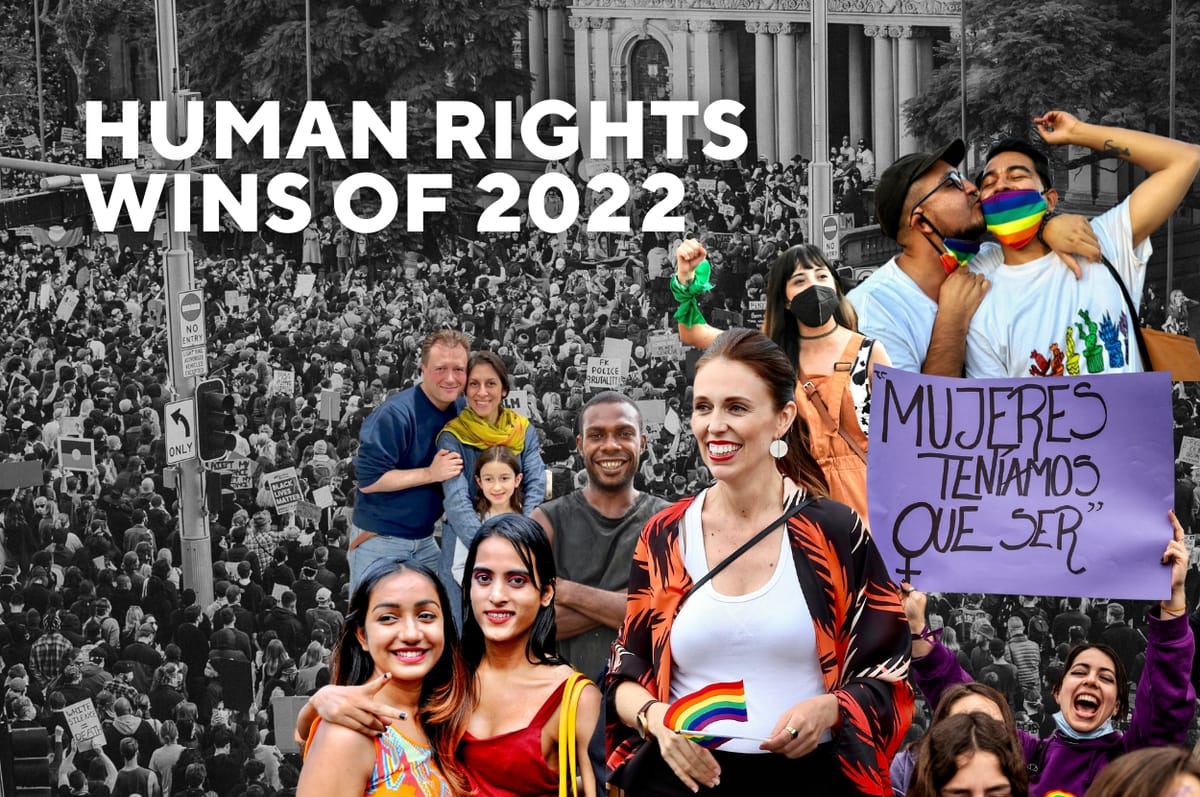8 Human Rights Wins To Celebrate In 2024
Here’s to another year of fighting for the world we want to see.

Progress is always possible.
In 2024, countries all around the world made strides towards a more free, just and equal world, reminding us that activism works when people come together.
Here’s to another year of fighting for the world we want to see.
1. Sierra Leone and Colombia both banned child marriage
Sierra Leone has one of the world’s highest rates for child marriage, early pregnancy and maternal deaths, with one third of girls married before they are 18.
On Friday June 21, the parliament passed a law that will make it a crime to marry girls aged below 18.
Colombia has also finally approved a bill to ban children under 18 from getting married.
It aims to establish educational programs to prevent child marriage and support young people.
2. France has become the first country to make abortion a constitutional right
Abortion has been legal in France since 1975, but now it is a “guaranteed freedom” under the constitution.
This means that future governments will not be able to “drastically modify” the law, which allows women to have abortions up to 14 weeks of a pregnancy.
The change, which had already been passed by both houses of parliament, gained final approval with 780 votes against 72 in the joint session.
Speaking after the vote, prime minister Gabriel Attal said that the decision sends a message to women that their bodies belong to them, and no one has to control it in their stead.
3. Thailand, Greece and Liechtenstein all legalized same-sex marriage
On Tuesday Sep. 24, Thailand’s king signed the bill into law after it was overwhelmingly passed by the country’s parliament in June.
The bill would change the definition of marriage to one between two individuals, instead of between a man and a woman.
Same-sex marriage also have been legal in Liechtenstein and Greece.
Greece has become the first Orthodox Christian country to legalize same-sex marriage.
Same-sex partnerships have been legal in Greece since 2015, but now same-sex couples can get married as well as legally adopt children.
4. Same-sex relations are no longer illegal in Dominica and Namibia
Due to a law imposed in 1873 during British colonial rule, sexual activities between adults of the same sex were banned in Dominica, even if both people had consented.
On Monday, April 22, the Caribbean country’s High Court ruled that parts of the law is unconstitutional.
In Namibia, sex between men had been a crime due to two colonial era laws from 1927.
In 2022, Friedel Dausab, a gay Namibian man, filed a case against the laws.
And on Friday June 21, the country’s high court struck down the laws, finding them unconstitutional.
5. Sweden and Germany made it easier for people to change their legal gender
Previously, people in Sweden needed to be 18 to change their legal gender.
But on Wednesday, April 17, the parliament passed a law lowering the age to 16.
Germany has also passed a new law that allows people to self-identify their legal gender.
It will allow people over 18 to choose their legal gender through a simple declaration.
6. A high court found Japan's ban on same-sex marriage to be unconstitutional
In Japan, the constitution defines marriage as one of “mutual consent between both sexes,” which has been commonly understood as not permitting same-sex marriage.
The decision comes after three same-sex couples in the district of Sapporo brought forward a case in 2019, demanding the right to get married.
On Thursday Mar. 14, 2024, the high court in Sapporo found that denying same-sex couples the right to get married is a violation of human rights.
On the same day, the Tokyo District Court also ruled that banning same-sex marriage is unconstitutional.
7. Ghana passed a law ensuring women hold 30% of decision-making roles in public jobs
The law, which was first introduced in 1998 and finally passed after nearly 30 years on Sep. 19, will also ban gender-based discrimination, including verbal abuse, as well as stereotyping, discriminating or disqualifying candidates based on their gender.
That number will then go up to 50% by 2030.
While the law is for public jobs, private sector companies that meet the gender balance target will be able to receive tax benefits.
8. Poland started drafting laws to lift its near-total ban on abortion
In 2020, Poland’s right-wing government outlawed abortions for fetal abnormalities, banning abortions for almost all cases.
In October 2023, people in Poland voted out the right-wing government for the first time in eight years.
And on Friday, April 12, lawmakers in the new center-left government voted to keep working on 4 bills that would ease access to abortion.
Making abortion accessible was a central campaign promise of Prime Minister Donald Tusk.
You Might Also Like











